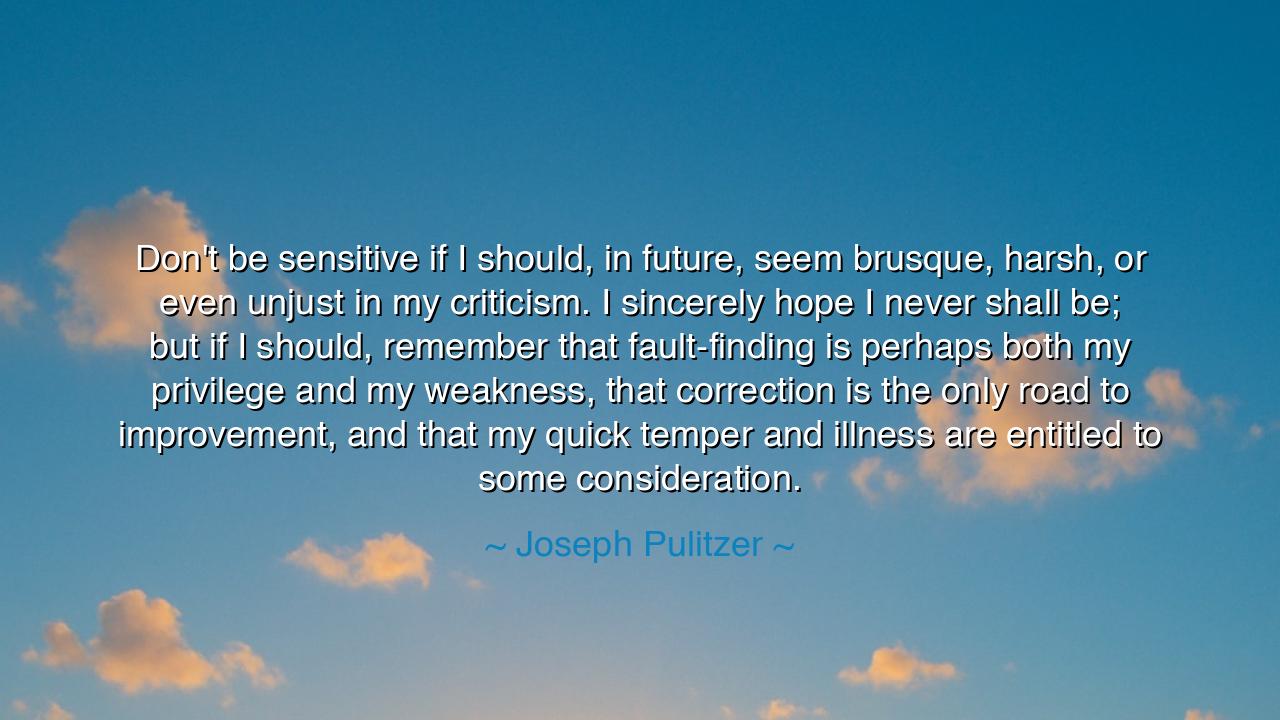
Don't be sensitive if I should, in future, seem brusque, harsh
Don't be sensitive if I should, in future, seem brusque, harsh, or even unjust in my criticism. I sincerely hope I never shall be; but if I should, remember that fault-finding is perhaps both my privilege and my weakness, that correction is the only road to improvement, and that my quick temper and illness are entitled to some consideration.






The words of Joseph Pulitzer — “Don’t be sensitive if I should, in future, seem brusque, harsh, or even unjust in my criticism... correction is the only road to improvement” — are not merely the apology of a stern master; they are the confession of a man who carried both greatness and burden within his heart. Pulitzer, a titan of journalism, a man of vision and fire, speaks here with the raw honesty of one who knows that perfection demands both discipline and pain. His quote reveals the eternal struggle between the pursuit of excellence and the frailty of the human soul — between the drive to refine others and the awareness of one’s own flaws.
In these words, the ancients would have heard echoes of the old masters who taught their disciples with firm hands and fierce words. For the path of correction has always been steep, and those who walk it must endure both the teacher’s rebuke and their own pride’s breaking. Pulitzer’s confession — that fault-finding is both his privilege and weakness — is the mark of self-awareness, rare among those in power. He admits that even as he demands greatness, he too is imperfect. It is as if a general, standing before his army, says: “Follow me to victory, though my sword arm may tremble.”
To understand this spirit, one might recall Socrates, who was accused of arrogance and harshness toward his pupils. Yet behind his relentless questioning burned a sacred intent: to awaken truth, to sharpen minds dulled by comfort. Like Socrates, Pulitzer’s harshness was the armor of care. His criticisms were not meant to wound but to sculpt — to chip away at mediocrity until the brilliance beneath could emerge. For only through friction is character refined, and only through honest critique can true excellence arise.
There is also a shadow in Pulitzer’s words — a confession of human vulnerability. He speaks of illness and temper, of the storms that rise within the human mind. He reminds us that even the greatest among us are fighting unseen battles. This humility transforms his statement from command to communion. It tells us that the teacher and the student, the critic and the criticized, are bound by a shared fragility. The wise man knows that greatness does not erase weakness; rather, it demands we rise above it with compassion.
In this, Pulitzer teaches a double truth: that criticism is love in disguise, and that to receive it without bitterness is an act of courage. The one who corrects does so to elevate, and the one who listens must endure the sting to grow. When the blacksmith strikes the iron, the hammer does not hate the blade — it shapes it. When a mentor scolds, it is not to destroy confidence, but to awaken discipline. The ancients called this the temperance of the soul, forged through fire, cooled in patience.
We may find a mirror of this wisdom in the story of Michelangelo and his apprentices. The great sculptor was known for his fiery temper, shouting at those who could not match his vision. Yet every harsh word came from devotion to beauty, from a refusal to let the imperfect stand unchallenged. Many who endured his anger later became masters themselves, because they learned not to be offended by correction, but transformed by it. Pulitzer’s message stands the same: harsh words, when born from purpose, are gifts disguised as wounds.
And so, let the lesson descend like a gentle flame upon your heart: Do not shrink from criticism, nor despise those who challenge you. Accept rebuke not as humiliation, but as a chisel that frees your potential. If you are a teacher or leader, let your correction be firm but compassionate, and if you are a learner, let your heart be strong enough to endure truth. For the road to mastery is not paved with praise, but with the dust of errors corrected and the patience of those who keep striving.
Thus, Joseph Pulitzer’s words endure as a timeless teaching — that correction is both pain and privilege, both the wound and the cure. To those who would rise above mediocrity, remember this: the hand that criticizes may tremble, but the soul that accepts correction becomes unbreakable. Walk the path of improvement humbly, and even the harshest voice will one day sound like wisdom.






AAdministratorAdministrator
Welcome, honored guests. Please leave a comment, we will respond soon